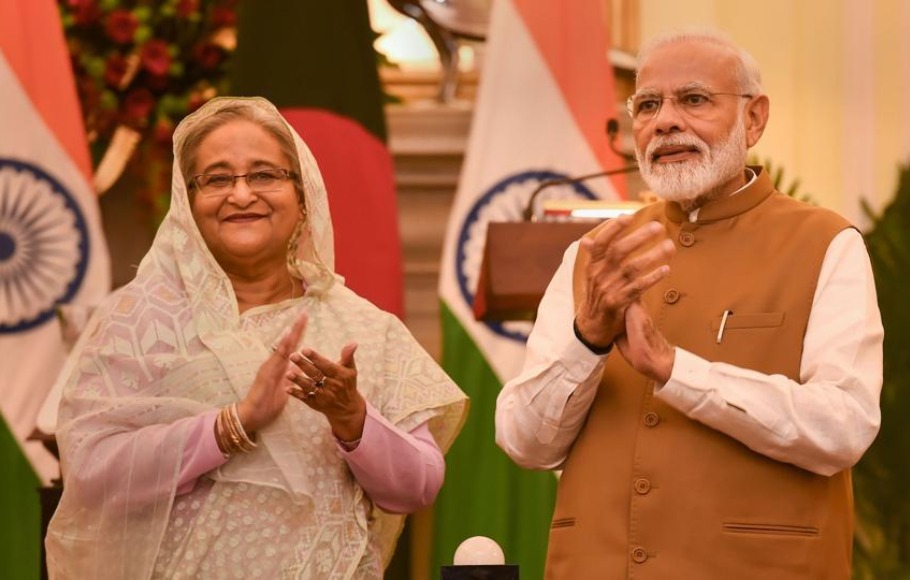
Modi's Bangladesh visit to be loaded with political message for Bengal voters
Prime Minister Narendra Modi is likely to send across a political message from Bangladesh to electorates in West Bengal, which will go to poll in eight phases starting on March 27.

Prime Minister Narendra Modi is likely to send across a political message from Bangladesh to electorates in West Bengal, which will go to poll in eight phases starting on March 27.
During his upcoming two-day visit to the neighbouring country on March 26-27, Modi is expected to visit a sacred shrine of “Matua” community at Orakandi in Gopalganj district and a “Satipith” in Shikarpur in Barishal district, reported Bangladesh Sangbad Sangstha, the country’s national news agency.
Taking a dig at the proposed visit, the Trinamool Congress (TMC) has thrown a diplomatic challenge at the prime minister. “At Orakandi, prime minister should announce that his government will give citizenship in India to all Matuas who are persecuted in Bangladesh,” said state president of the TMC’s Refugee Cell Mukul Chandra Bairagya, a prominent Matua face of the party.
Also read: Mamata miffed at Bengal poll dates, says ‘convenient for Modi, Shah’
There has been disquiet in Bangladesh over the CAA that seeks to provide citizenship to persecuted religious minorities from Pakistan, Bangladesh and Afghanistan.
The BJP is under pressure from the Matua community to implement the CAA as promised before the general elections.
Overwhelming support of the Matua community is one of the factors attributed to the BJP’s victory in 18 parliamentary constituencies in 2019 Lok Sabha elections. It won over the support of the refugee community, promising them citizenship under the new Citizenship Amendment Act (CAA).
The delay in framing rules to implement the Act, however, has now made the community restive, making the BJP apprehensive of losing their votes.
Also read: In poll season, Mamata adds ‘Maa’ to birth-to-death welfare schemes
Modi’s impending visit to Orakandi is seen as an attempt to touch a chord with the Matuas.
The shrine at Orakandi is the most sacred pilgrimage centre for the ‘Matua’ community, a Hindu sect born out of a reformist movement around 1860 by Harichand Thakur.
The apex body of the Namasudra community, a Scheduled Caste group, the Matua Mahasangha was first formed at Orakandi.
The founder of the sect, Harichand Thakur, also died in 1878 at Orakandi, enhancing the religious significance of the place for the community that can influence outcome in about 70 assembly constituencies, some of which will go to poll on March 27, the day Modi is likely to be at Orakandi.
On the same day, Modi is also expected to visit the Shikarpur temple, dedicated to goddess Sunanda, an incarnation or avatar of goddess Durga as per Hindu mythology.
Incidentally, the TMC has been trying to pit ‘Durga’, the most revered deity of Bengali Hindus, against BJP’s Hindutva driven by the motivational slogan of ‘Jai Shri Ram.’
According to news reports in Bangladesh, the Indian security apparatus already did a recce of the two religious places ahead of the high-profile visit.
The reports in Bangladesh media also suggest that Modi expressed his desire to visit the ancestral home of freedom fighter Bagha Jatin and Rabindra Kuthi Bari, a country house built by Dwarkanath Tagore, father of poet Rabindranath Tagore in Kushtia. The poet lived a part of his life there.
The prime minister’s likely visit to places with emotional connect with voters in West Bengal is seen as an extension of the BJP’s poll strategy in Bengal, where it is trying to appropriate an average Bengali’s icons and culture in a bid to ward off the “outsider” tag levelled on the party by the Trinammol Congress.
Modi will visit the neighbouring country at the invitation of his Bangladeshi counterpart Sheikh Hasina, to join the 50th anniversary celebration of independence of Bangladesh, the birth centenary of Bangabandhu Sheikh Mujibur Rahman, the nation’s founding father and the 50th year of Bangladesh-India diplomatic ties.


